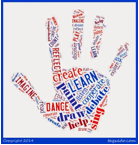Lesson 13: Philosophy Outline
Attention

Learning Outcomes
Upon completion of this lesson's material, students will be able to:
- Explain the importance of philosophies
- Reflect upon their own beliefs and values
- Outline their beliefs and values into a philosophy
Teaching
 To be a professional, it is important to have opinion on important topics related to your field and create beliefs or a philosophy on your approach. For some jobs, employers may ask you to explain your own personal philosophy on early education so they can get a better idea of who you are as an educator. When thinking about who you are as an educator it is important to include many topics such as roles, learning styles, discipline, technique, etc. etc. For this lesson in particular you will not be writing your philosophy but just creating an outline.
To be a professional, it is important to have opinion on important topics related to your field and create beliefs or a philosophy on your approach. For some jobs, employers may ask you to explain your own personal philosophy on early education so they can get a better idea of who you are as an educator. When thinking about who you are as an educator it is important to include many topics such as roles, learning styles, discipline, technique, etc. etc. For this lesson in particular you will not be writing your philosophy but just creating an outline.
Through this course you have probably started to form some solid beliefs about how things work in the education field. While your beliefs are most valid, there is still more to learn and experience. A philosophy is an ongoing piece of work. Our course our major values and beliefs will be the same but the specifics may change with new research and experience.
I want you to think back throughout the course about what you have learned. Read back through your journal and pick up the common themes and emotions. Truly ask yourself, “What do I believe in?
Some things to consider might be:
- What you believe the purpose of early care and education is
- The role of the student
- The role of the educator
- Who will you be teaching and why did you choose that age?
- What are your beliefs about how children learn? And how will that impact your:
- Classroom management
- Teaching style
- Curriculum beliefs
- Assessment beliefs
- Classroom management
- How do you address the different learning styles in the classroom?
- How do you address diversity of special needs, cultures, class and family dynamics (there are plenty more examples)
- How will you handle different types of temperaments in the classroom?
- How will you individualize?
- How will you involve families?
- How do you work with others? – your co-teachers, assistants?
- How will you include the community? - the fire station, library etc.
- How well do you collaborate? – with mental health or special educators etc.
- Do you follow a specific theorist and why?
- What is your stance on technology in early care and education?
Treat this philosophy as a reflection of YOUR beliefs and who you are as an educator.
To get your brain going see the following examples of philosophies. Keep in mind you are only creating an OUTLINE….. you will draft in the next practicum and finalize in the final practicum. For now…. Just think OUTLINE
Click HERE to reivew some example of Education Philosophies...Click HERE to see a sample Outline of an Education Philosphy Statement.
Assessment
These Lesson Plans are "Universal" in that they are used for both our face-to-face and Online course offerings. The instructions for the "Discussions" found in this section are for the Online classes only unless otherwise indicated by your Instructor.
Lesson 13 Assignment
Begin to jot down ideas about what you believe and value in education. Turn those ideas into “I Believe………..” or “I will………..”
Check your thoughts to make sure they are POSITIVE – I want to know what you CAN and WILL do not what you are frustrated about and will not do.
Be SPECIFIC instead of “I believe all children can ….. “ Say, “I believe that in my classroom all children will…….”
The outline should be AT LEAST one page, full sentences and comprehendible. No larger than size 12 font and only Times New Roman font. I know this is an outline but you still need to be professional about it. Put some though into this….be original….be true.
Pass in a DRAFT of this. Your instructor will look at it and then you will have a chance to redo it based on initial feedback.
The goal here is draft an outline. I will simply provide feedback and you will draft it again. The grading rubric will be used only upon the second time you pass it in.
Lesson 13 Discussion
Share your deepest belief that is in your philosophy outline. Why did you chose to share that particular one?